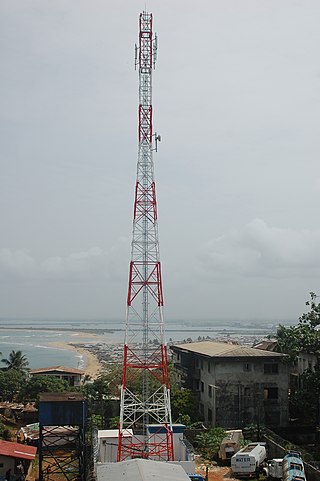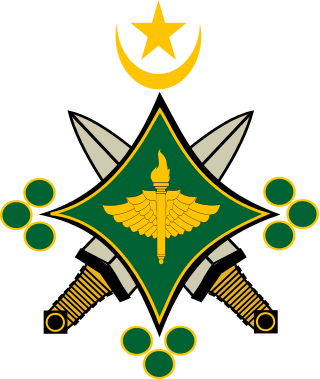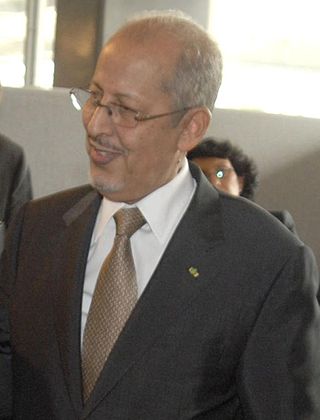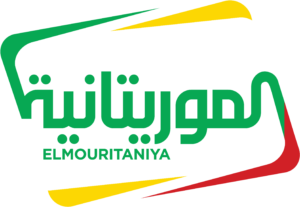
Mass media in Liberia include the press, radio, television, fixed and mobile telephones, and the Internet.

The Armed Forces of Mauritania is the defence force of the Islamic Republic of Mauritania, having an army, navy, air force, gendarmerie, and presidential guard. Other services include the national guard and national police, though they both are subordinated to the Ministry of the Interior. As of 2018, the Mauritanian armed forces budget was 3.9% of the country's GDP.

Nouakchott is the capital and largest city of Mauritania. Located in the southwestern part of the country, it is one of the largest cities in the Sahara. The city also serves as the administrative and economic center of Mauritania.

The mass media in Burkina Faso consists of print media and state-supported radio, news, and television stations, along with several private broadcasters with programs consisting of sports, music, cultural, or religious themes.
Mass media in Morocco includes newspapers, radio, television, and Internet.

The foreign relations of the Islamic Republic of Mauritania have, since 1960, been dominated by the issues of the Spanish Sahara and the recognition of its independence by its neighbours, particularly Morocco. Mauritania's foreign relations are handled by the Minister of Foreign Affairs and Cooperation, who is currently Mohamed Salem Ould Merzoug.

Sidi Mohamed Ould Cheikh Abdallahi was a Mauritanian politician who was President of Mauritania from 2007 to 2008. He served in the government during the 1970s, and after a long period of absence from politics he won the March 2007 presidential election, taking office on 19 April 2007. He was deposed in a military coup d'état on 6 August 2008.
Zeine Ould Zeidane is a Mauritanian economist and politician. He placed third as a candidate in the March 2007 presidential election, and he subsequently served as Prime Minister from April 2007 to May 2008.
Ibrahima Moctar Sarr is a Mauritanian journalist and politician of the Fulani ethnicity. Running as an independent candidate, he placed fifth in the March 2007 presidential election, and he has been the President of the Alliance for Justice and Democracy/Movement for Renewal (AJD/MR) party from August 2007 until January 2024.

Algeria has more than 45 independent Arabic language and French language publications as well as 4 government-owned newspapers, but the government controls most printing presses and advertising. The Algerian newspapers with the largest circulations are Echourouk (1,800,000), Ennahar (1,600,000), El Khabar (1,000,000) and Quotidien d'Oran (700,000); all four are employee-owned. In 2004 and 2005, the government increased the access of Berber language and culture to both print and broadcast media.

Yahya Ould Ahmed El Waghef is a Mauritanian politician. He was appointed as Prime Minister of Mauritania on 6 May 2008, serving until the August 2008 coup d'état. Waghef is also President of the National Pact for Democracy and Development (ADIL), and he was Secretary-General of the Presidency from 2007 to 2008.

Mohamed Ould Abdel Aziz is a retired Mauritanian military officer and politician who served as the 8th president of Mauritania from 2009 to 2019.

Mauritania, officially the Islamic Republic of Mauritania, is a sovereign country in Northwest Africa. It is bordered by the Atlantic Ocean to the west, Western Sahara to the north and northwest, Algeria to the northeast, Mali to the east and southeast, and Senegal to the southwest. By land area Mauritania is the 11th-largest country in Africa and 28th-largest in the world; 90% of its territory is in the Sahara. Most of its population of some 4.3 million lives in the temperate south of the country, with roughly a third concentrated in the capital and largest city, Nouakchott, on the Atlantic coast.

The Television of Mauritania is Mauritania's national state-owned public service television broadcaster. Currently, the broadcaster is a member of the Arab States Broadcasting Union (ABSU).
Mass media in Chad is controlled by the government.
The mass media in Gabon is primarily monitored by the Gabon government. Although the main newspapers are associated with the government, there are private broadcasters, and private weekly newspapers that are mostly controlled by opposition parties.
Mass media in the Republic of the Congo are severely restricted by many factors, including widespread illiteracy and economic underdevelopment.
Mass media in Togo includes radio, television, and online and print formats. The Agence Togolaise de Presse news agency began in 1975. The Union des Journalistes Independants du Togo press association is headquartered in Lomé.
The following is a timeline of the history of the city of Nouakchott, Mauritania.

Parliamentary elections were held in Mauritania on 13 and 27 May 2023, alongside regional and local elections.











